112 Search Results for lauren enders
March 27, 2016
by Carole Zangari -
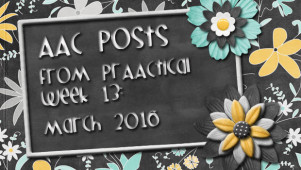
Happy Sunday, prAACtical friends. Hope you’re taking some time to recharge, Monday – PrAACtically Pinteresting with Lauren Enders: AAC Video Examples Wednesday – Video of the Week: Boosting Communication with Video Modeling Thursday – PrAACtically Reading with Karen Natoci: April Fool’s Day Above everything else, AAC is a person’s communication tool. If it’s not always available, it’s not AAC.
February 28, 2016
by Carole Zangari -
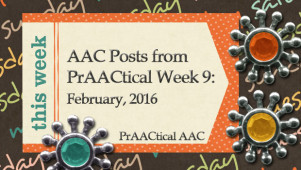
Here are some AAC posts you may have missed. Monday – PrAACtically Pinteresting with Lauren Enders: Apps for Implementation Tuesday – From Conversation to Skill-building Thursday – AAC Assessment Corner by Vicki Clarke: Thinking Inside the Box
December 31, 2015
by Carole Zangari -

Goodbye, December! Before we turn the calendar page, here are some of the most popular posts of 2015. Many thanks to Lauren Enders, Rachael Langley, and all of our guest bloggers for being so generous with their time and expertise. I couldn’t do it without you!! 5 Great Resources for Pre-Made Communication Boards How I Do It: Writing IEP Goals for Students Who Use AAC with Lauren Enders How I Do It by Rachael Langley – PODD in the Classroom: Portable, Wearable, & Comfortable How I Do It: Using PODD books and Aided Language Displays with Young Learners with Autism Spectrum Disorder Core Samples Teaching Core Vocabulary A Year of Core Vocabulary Words Pivotal Skills for AAC Intervention: Aided Language Input Literacy for Everyone with Adapted Books Communication Boards: Colorful Considerations 30 Ways to Celebrate Autism Awareness Month
May 19, 2015
by Carole Zangari -
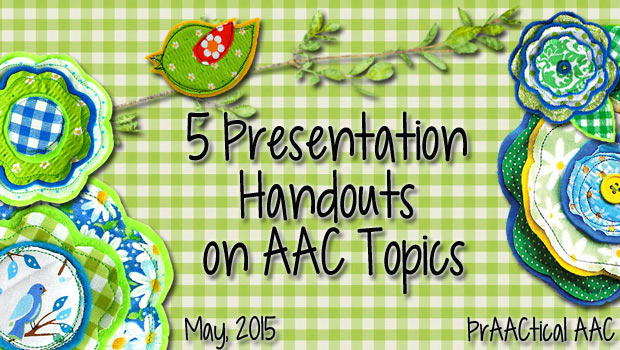
AAC people are notorious for their love of professional development. If you haven’t been able to attend as many conferences as you would have liked, you might enjoy these handouts from AAC presentations in the US and Australia. Jane Farrall and Sally Clendon (AGOSCI, May 2015): Self-selected Reading Ashley Robinson (NCACA, 2015): Building Classroom Communities to Support AAC Users Caroline Musselwhite, Erin Sheldon, Deanna Wagner, Laurel Buell, & Gretchen Hanser (Closing the Gap, 2014): Communication Circles Lauren Enders (ATIA, 2014): AAC-Ideas for Infusing Core Language Across the Curriculum Jennifer Buxton (ATIA, 2014): AT Implementation in the School Setting – Struggles and Successes
July 2, 2014
by Carole Zangari -
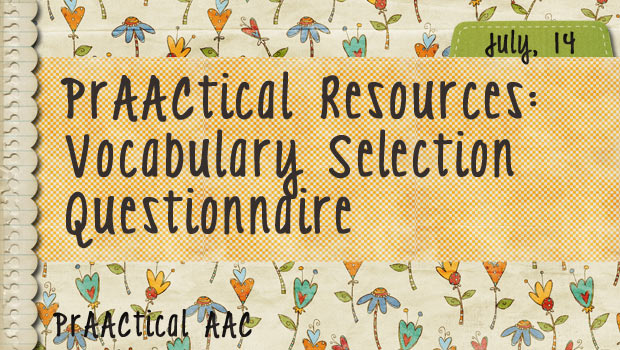
One of our prAACtical friends will be getting an AAC device soon, so it got us thinking about customizing the SGD with vocabulary that he will want to learn and use. Core words are central, for most people who use AAC, but we always want to include the words that help them express very specific and personal experiences. There are several checklists and questionnaires floating around that can help identify the fringe vocabulary. Here are two of our favorites. Young children: AAC Team at Penn State University. School-aged Students: Lauren Enders and Laurie McGowan Do you have a vocabulary selection checklist or form that you like to use? We’d love to hear about it.
April 4, 2014
by Carole Zangari -
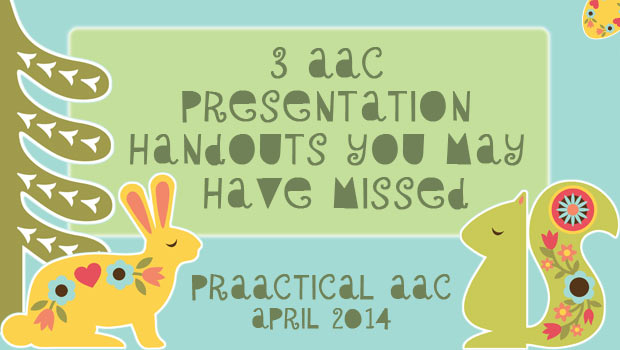
Couldn’t get to the ATIA conference in Orlando in January? Here are some wonderful handouts from three AAC presentations. Lauren Enders: AAC-Ideas for Infusing Core Language Across the Curriculum Kate Ahern: Bringing AAC Home Jennifer Buxton: AT Implementation in the School Setting – Struggles and Successes The Call for Papers for the next ATIA conference will be out later this month. Hope to see you there in 2015!
December 27, 2013
by Carole Zangari -

It’s been a wonderfully prAACtical year. Here’s a look back at our top 10 most popular posts. Anyone see any patterns? 🙂 How I Do It: Writing IEP Goals for Students Who Use AAC by Lauren Enders Teaching Core Vocabulary 5 Great Resources for Pre-Made Communication Boards Core Samples A Year Of Core Vocabulary Words AAC ‘Must Haves’ the the Classroom and Therapy Room Pivotal Skills for AAC Intervention: Aided Language Input How I Do It: AAC in the IEP by Lauren Enders Getting Started with Core Vocabulary More on Teaching Core Vocabulary
December 1, 2013
by Carole Zangari -
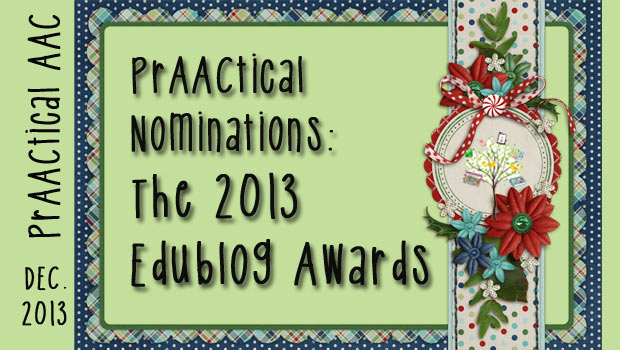
The Edublog Awards recognize the power of the individual to make a positive impact in education-related fields. We were so surprised to hear from Jenna Rayburn, author of the popular Speech Room News blog and TpT Store, that she had nominated us for the 2013 Eddies. It got us to thinking about our own favorites from the past year (so many wonderful blogs and bloggers!). Here are our nominees: Best individual blog: Chapel Hill Snippets Best class blog: Considerate Classroom Best ed tech/resource sharing site: Boardmaker Achieve Best teacher blog: Think Inclusive Most influential blog post of the year: SLPs and AAC Evaluations: First, Do No Harm Best individual tweeter: Brian Goldstein, @goldstein25 Best twitter hashtag: #AugComm Best free web tool: Jing Best educational use of audio/video podcast: Laura Mize, Teach Me to Talk podcasts Best educational wiki: CommunicatePA Best open PD/webinar series: AbleNet Best educational use of a social network: Pinterest,... [Read More...]
October 31, 2013
by Robin Parker -
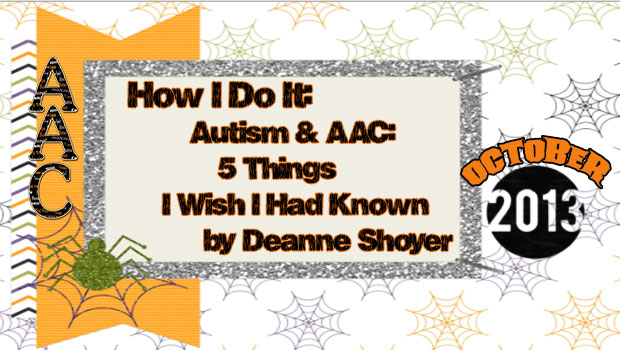
We are so pleased to have connected with Deanne Shoyer from Small But Kinda Mighty and even happier that she is our guest blogger today. Deanne is a mom of twin boys who both are on the autism spectrum. Deanne successfully fundraised to buy iPads for her boys and has been active for more than 3 years in social media and in the special needs app community. She has written about many things but often focuses on implementing AAC in a very PrAACtical way. Please feel free to share this very important post as she highlights AAC, what she has learned, and how it may help others. by Deanne Shoyer at Small But Kinda Mighty (original post at Small But Kinda Mighty) In the title of this post I’ve linked autism and AAC for a specific reason. A lot of the points here are equally applicable to people who have a... [Read More...]
October 26, 2013
by Robin Parker -
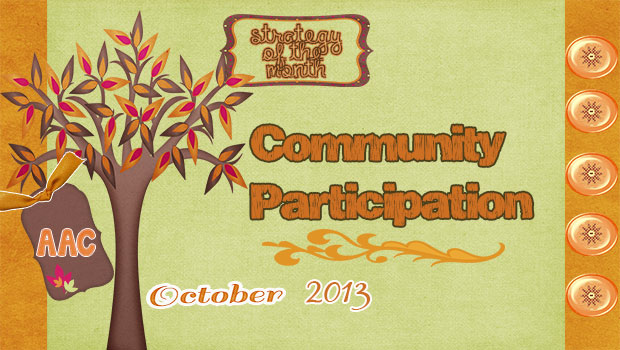
Community participation and communication for AAC users is an integral part of of developing, growing up, and having inclusive opportunities. We often relate community participation to quality of life indicators. Community participation for AAC users begins from the… beginning. Young children can order in restaurants, use picture menus, and have access to many inclusive events. As children grow into adolescents and adults, community participation involves post secondary options, employment, and community living. Perspectives from AAC Users Have communication displays and devices available at ALL times– You need access to a communication system(s) to participate in all situations. Remember to take AAC with you. The sooner the AAC user becomes responsible for taking or telling someone to take the device/displays with them the easier it becomes. For mobile technology systems, there are rugged cases that withstand wind, water, even medical waste (see Lauren Enders Pinterest boards for case and accessory options).... [Read More...]









